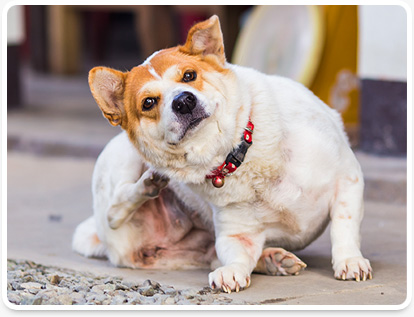Pet Dermatology Services

Dermatology services are an important part of your pet's health care plan. Our veterinarians have extensive experience and capabilities in diagnosing and treating skin problems. Allergies are the most common cause for dermatological issues, but other factors such as infectious, immune, mediated, parasites, hormonal, dietary and physiological are always considered.
We routinely perform cytology, skin scrapings, bacterial and fungal cultures, skin biopsies, allergy testing, hormone assays, nutritional evaluation and more. There are a wide variety of veterinary dermatological treatment options that can be tailored to you pets specific needs.
Allergies and Skin Problems in Dogs and Cats
Allergies are quite common in dogs of all breeds and backgrounds, maybe due to fleas, but can also be the result of food or an inhaled irritant like dust or pollen. Most allergies appear after the pet is 6 months of age with the majority of affected dogs over 2 years of age. The most common symptom associated with allergies is itching of the skin, either localized or generalized. Other symptoms include respiratory distress (coughing, sneezing and wheezing) or digestive problems causing vomiting, flatulence or diarrhea.
Flea allergy is a common allergy in cats. A normal cat experiences only minor skin irritation at the site of the bite. The flea allergic cat, on the other hand, has a severe, itch-producing reaction when the flea's saliva is deposited in the skin. Just one bite causes such intense itching that the cat may severely scratch or chew itself, leading to hair loss and open sores or scabs on the skin. The area most commonly involved is over the rump or base of the tail.

Symptoms of Pet Skin Allergy
It is important to be able to identify the first signs and symptoms of allergies and dermatological conditions, including:
- Scratching, licking, chewing or biting the skin, feet and ears
- Red, raised, scaly areas on the skin
- Bumps, crusts or pus-filled vesicles on the skin
- Increased skin pigmentation
- Thickened skin
- Loss of hair
- Salivary staining (brown color)
- Head shaking
If left untreated, allergic reactions and skin conditions can become serious medical concerns. If your pet is exhibiting any of the symptoms listed above, please discuss them with your veterinarian during your appointment.

